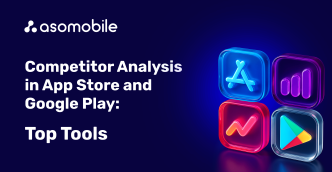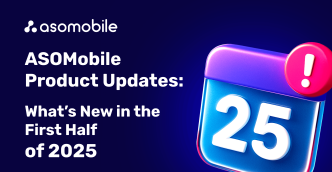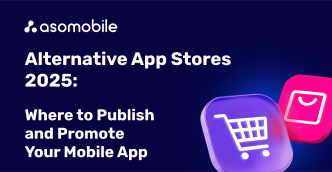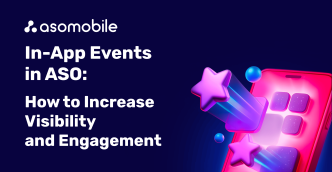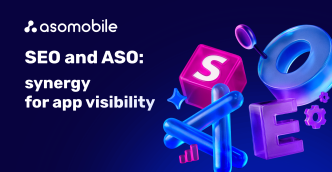AI integration: mobile app marketing
Artificial intelligence (AI) burst onto the global market in 2022 and has only been gaining momentum since then. Artificial intelligence is not just one technology, it is an entire industry. AI is a replica of human intelligence, with the same functions - thinking, making decisions, performing tasks, solving problems, searching and analyzing information. Over time, AI options will only expand, since machine learning occurs 24/7, AI does not need to sleep, eat, travel, spend time with family or reflect. It is functional around the clock and yo2u can and should use it.
Currently, the mobile market has more than 5.5 million apps (Google Play 3.7 and Apple App Store 1.8) and this is a more than competitive environment. In such settings, human resources and capabilities are definitely worth complementing with AI potential.
The ASOMobile team is delighted with the new horizons and emerging prospects of artificial intelligence, so it is in a hurry to share already established trends in the use of AI in marketing and ASO.
Mobile app market
- Prevalence of mobile applications
Mobile apps have become an integral part of everyday life. The times when you could only make phone calls are long gone. The phone is no longer a phone, it is now a smartphone and deservedly bears the smart prefix. A fairly compact rectangle made of plastic and microcircuits has become a personal assistant for almost any person - it will remind, wake up, count, entertain, teach, show videos and play audio. Thanks to a smartphone, you can buy, sell, exchange, pay, plan, see loved ones on another continent, meet, watch and listen to interesting things. For example, in China it is no longer possible to live without a smartphone, since even the most basic payments can only be made through special applications. Super apps are gaining momentum around the world. In China, in one such application you can pay utility bills, make an appointment with a doctor, call a taxi and communicate on social networks.

- Digital economy
Absolutely any application can and should generate income. By the way, ASOMobile recently wrote about App Monetization trends in 2025.
It’s clearly too early to sum up the results of 2024, especially since the marketing year will begin only in July, but 2023 showed an increase in consumer spending on applications by 3%, which is equivalent to $171 billion. 67% of consumer purchases were made through mobile applications.

But there is also a separate huge layer of apps - games. Games bring 60% of the total global mobile market revenue. For comparison, social networks provide 10% of profit. 5G Internet, virtual and augmented reality, and blockchain technologies greatly contribute to the development of the mobile gaming industry. Consequently, new profitability records are still ahead.

- User engagement
The numbers here speak louder than any words, here are some of them:
- 55.5% of people use social networks
- 24.3% play casual games and 17.1% spend time in online casinos of all kinds
- 13.5% of users watch movies and listen to music in entertainment apps
- 6.3% of respondents manage their finances through a variety of financial apps.

And this happens every day all over the world.
- A little more background information
The numbers above are scary and inspiring at the same time.
On the one hand, competing among 5.5 million apps in both stores seems like something out of science fiction, but on the other hand, a bite out of the $171 billion pie is desired to be taken.
This is where His Majesty AI comes onto the stage under the spotlights and the beat of drums. Influencer Marketing Hub concluded that 60% of users use artificial intelligence in their daily lives in one way or another. Basically, these are photo and video editors for processing files and text chats in question-answer format. At the same time, 54.5% of marketing professionals rely on AI in their professional field. The same graphic and text AI chats are also popular with them; only the goals and scale of information processing differ. The popularity of AI tools among marketers is growing so rapidly that by 2028 the projected market size for AI utilities in marketing will exceed $107.5 billion. So we can safely say that generative artificial intelligence has gone beyond its use only in games and has begun a triumphant march in the field of marketing and advertising. Such large players in the metaverse as Alphabet, Amazon, Meta, Unity are already making full use of AI in their cases for advertisers.
AI and mobile app marketing
To gain a deeper understanding of the issue, let’s first dive into the theory.
- AI (artificial intelligence) is actually artificial intelligence itself. AI is not something specific, it is a broad umbrella term that combines technologies and techniques aimed at creating machines capable of performing tasks that require human intelligence. It's like a copy of the human cerebral cortex. AI uses different approaches - rules, logic, algorithms and machine learning (ML).
- ML (machine learning) - algorithms and models on which AI is trained.
- LLM (large language model), despite the literal translation - a large language model is still the same good old algorithm, trained on extremely large volumes of text data. Its feature is natural language processing, due to which LLMs are able to process complex language tasks, understand and generate texts in human languages, translate, answer questions and write context.
- From all this comes generative AI - this is a more specific type of AI, with the task of creating texts, images, content and all kinds of media files according to prompts given by a person. The most famous and advanced today is ChatGPT.
Now that we have understood the terms and definitions, let’s finally move on to the capabilities of AI and how to use it in marketing and ASO.
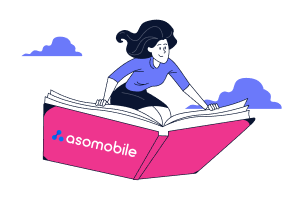
- Creating and Analyzing the Semantic Core
- Text Optimization for App Store and Google Play
- Icon, Screenshots, Video. A/B Testing
- Featuring, Similar Apps, Ratings, Working with Reviews
Automating and increasing the efficiency of data collection and analysis
Any marketing and ASO in particular includes monotonous and repetitive tasks. The same collection and analysis of data is quite boring and routine work for a living person. This type of work is tiring, thereby increasing the risk of errors known as human error. Therefore, you can safely entrust this template work to AI, and free up time for a living specialist to be creative and find original solutions to strategic problems. The bonus is a significant reduction in potential errors that are inevitable when working with data. Data collection and analysis is followed by implementation. This process can also be delegated to AI. He will do this faster and more efficiently than people, because his algorithms are designed specifically for processing large amounts of information, while human capabilities are still limited in this matter.
UX optimization
All marketers know that UX (User Experience) is important. Optimizing the user experience while interacting with the app can be delegated to AI. Away with annoying push notifications and tons of e-mail spam, AI will select truly individual and personalized approaches through constant learning and, resulting from it, understanding of human behavior. AI analyzes user behavior based on their previous actions and optimizes UX processes in accordance with customer preferences. As a result, this provides truly useful, necessary and, therefore, pleasant information to the user. And where it’s “nice” there is an increase in satisfaction and loyalty. An excellent example of high-quality personalization are YouTube and Netflix, which recommend new video products to the user based on previous views.
Marketing
Focus groups, lead assessments, and marketing platforms are a thing of the past, at least for the mobile app market. Now artificial intelligence can analyze not just the target audience, but the entire application industry. The AI has at its disposal a huge database of demographic groups, a variety of texts on given topics and related areas, marketing questions and consumer responses to them, and much, much more. Marketing is reaching a new global level, where a modern mobile app marketer needs to catch the wave by connecting AI as assistants and enjoying the fruits of its labors.
Content
The headache of any marketer is no longer a pain. You no longer need to spend hours analyzing user behavior in order to better design push notifications or promotional texts. And any other content necessary for the application. Now it's the AI's job. It will help you select relevant topics for interaction with clients and offer options for text content and personalized messages. Anything, based on the text prompts specified by the marketer. We are talking not only about texts, but also about graphics. So far, complex images are difficult for AI, but it can handle creating icons and badges quite well. So, a marketer sets a task, and AI completes it. Mission completed.
Monetization and advertising
AI does an excellent job of monetizing and advertising the app.
Firstly, he can be tasked with finding the best ways to generate income even before the application is released. The main thing here is to write the task in very detail and specifically in ChatGPT.
Secondly, it will cope with the monetization of an existing app. Because he has at his disposal the entire database for a specific app and many other data sets. In total, this helps artificial intelligence distinguish customers who are willing to pay from those who are not going to do so. And then the personalization described above comes into play.
AI is also very useful in advertising. It can generate and optimize advertising, create push messages and user profiles, and target. But in the context of advertising, AI should still be combined with other tools.
Localization
Any marketer knows that localization increases target audience reach. For competent, and therefore successful localization, simply translating the app into the language of the region is not enough. It is necessary to take into account local culture, mentality, and traditions. And AI does an excellent job of this task, thanks to LLM. Generative AI based on complex language models will generate intelligent translation and high-quality content based on large-scale databases of the required locale. The initial product will be competent, correct, relevant and will save a living marketer a lot of precious time. Pure profit.
Confidentiality
Perhaps this is the only weak point of the AI. With access to massive amounts of data, artificial intelligence can sometimes be frighteningly accurate. Everyone has experience with contextual advertising, which seems to read minds. In this regard, more and more users are demanding increased protection of personal data. Currently, many countries are already considering certain restrictions on the use of AI at the legislative level. And while the relevant regulations are only being discussed in Europe and the United States, China, not surprisingly, has already introduced some temporary bans.
We must understand that any restrictions will affect the quality of AI work, which is not beneficial for either AI developers or AI consumers. In parallel, reducing the capabilities of AI in terms of privacy will lead to a decrease in the quality of machine learning (ML), which will inevitably affect both the characteristics of the artificial intelligence itself and the products it produces. Therefore, synthetic data is now being actively developed and introduced. This is data created on the basis of real parameters, qualitatively conveying the real picture, but at the same time providing a high level of privacy protection. A kind of truthful simulator that protects the owner of personal data, does not limit the capabilities of AI and does not degrade the user experience.
Conclusions
The purpose of this article was to describe the general vectors of using artificial intelligence in marketing and ASO, because for each AI tool you can write at least one more article of the same kind, or even a full-fledged book.
But it’s better to apply it once and gain invaluable personal experience than to read about someone else’s practice a hundred times. Therefore, catch the wave and start using AI now!
 Українська
Українська  Русский
Русский  Español
Español 